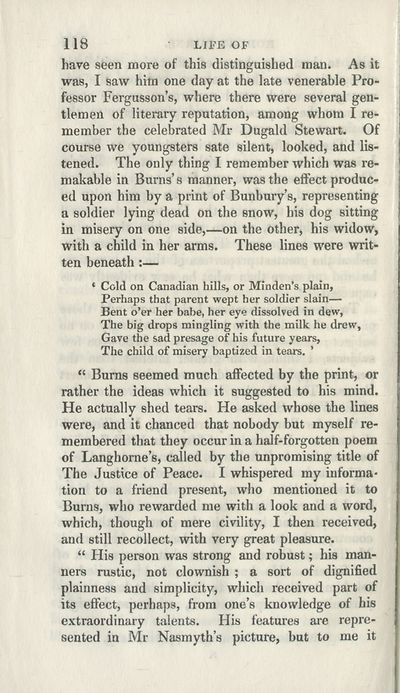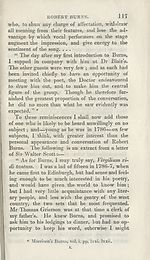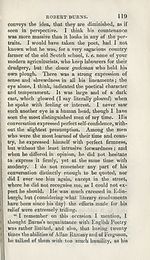Scotland/Scots > Life of Robert Burns
(128)
Download files
Complete book:
Individual page:
Thumbnail gallery: Grid view | List view

LIFE OF
118
have seen more of this distinguished man. As it
was, I saw him one day at the late venerable Pro¬
fessor Fergusson’s, where there were several gen¬
tlemen of literary reputation, among whom I re¬
member the celebrated Mr Dugald Stewart. Of
course we youngsters sate silent, looked, and lis¬
tened. The only thing I remember which was re-
makable in Burns’s manner, was the effect produc¬
ed upon him by a print of Bunbury’s, representing
a soldier lying dead on the snow, his dog sitting
in misery on one side,—on the other, his widow,
with a child in her arms. These lines were writ¬
ten beneath:—
‘ Cold on Canadian hills, or Minden’s plain.
Perhaps that parent wept her soldier slain—
Bent o’er her babe, her eye dissolved in dew,
The big drops mingling with the milk he drew.
Gave the sad presage of his future years,
The child of misery baptized in tears. ’
“ Burns seemed much affected by the print, or
rather the ideas which it suggested to his mind.
He actually shed tears. He asked whose the lines
were, and it chanced that nobody but myself re¬
membered that they occur in a half-forgotten poem
of Langhorne’s, called by the unpromising title of
The Justice of Peace. I whispered my informa¬
tion to a friend present, who mentioned it to
Burns, who rewarded me with a look and a word,
which, though of mere civility, I then received,
and still recollect, with very great pleasure.
“ His person was strong and robust; his man¬
ners rustic, not clownish ; a sort of dignified
plainness and simplicity, which received part of
its effect, perhaps, from one’s knowledge of his
extraordinary talents. His features are repre¬
sented in Mr Nasmyth’s picture, but to me it
118
have seen more of this distinguished man. As it
was, I saw him one day at the late venerable Pro¬
fessor Fergusson’s, where there were several gen¬
tlemen of literary reputation, among whom I re¬
member the celebrated Mr Dugald Stewart. Of
course we youngsters sate silent, looked, and lis¬
tened. The only thing I remember which was re-
makable in Burns’s manner, was the effect produc¬
ed upon him by a print of Bunbury’s, representing
a soldier lying dead on the snow, his dog sitting
in misery on one side,—on the other, his widow,
with a child in her arms. These lines were writ¬
ten beneath:—
‘ Cold on Canadian hills, or Minden’s plain.
Perhaps that parent wept her soldier slain—
Bent o’er her babe, her eye dissolved in dew,
The big drops mingling with the milk he drew.
Gave the sad presage of his future years,
The child of misery baptized in tears. ’
“ Burns seemed much affected by the print, or
rather the ideas which it suggested to his mind.
He actually shed tears. He asked whose the lines
were, and it chanced that nobody but myself re¬
membered that they occur in a half-forgotten poem
of Langhorne’s, called by the unpromising title of
The Justice of Peace. I whispered my informa¬
tion to a friend present, who mentioned it to
Burns, who rewarded me with a look and a word,
which, though of mere civility, I then received,
and still recollect, with very great pleasure.
“ His person was strong and robust; his man¬
ners rustic, not clownish ; a sort of dignified
plainness and simplicity, which received part of
its effect, perhaps, from one’s knowledge of his
extraordinary talents. His features are repre¬
sented in Mr Nasmyth’s picture, but to me it
Set display mode to:
![]() Universal Viewer |
Universal Viewer | ![]() Mirador |
Large image | Transcription
Mirador |
Large image | Transcription
| Antiquarian books of Scotland > Scotland/Scots > Life of Robert Burns > (128) |
|---|
| Permanent URL | https://digital.nls.uk/108247395 |
|---|
| Description | Thousands of printed books from the Antiquarian Books of Scotland collection which dates from 1641 to the 1980s. The collection consists of 14,800 books which were published in Scotland or have a Scottish connection, e.g. through the author, printer or owner. Subjects covered include sport, education, diseases, adventure, occupations, Jacobites, politics and religion. Among the 29 languages represented are English, Gaelic, Italian, French, Russian and Swedish. |
|---|

